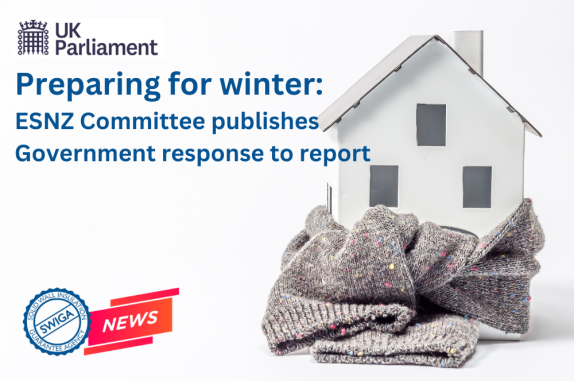SWIGA NEWS
Latest Industry News
Preparing for the winter: Government Response

On the 15th December 2023 the Energy Security and Net Zero Committee published the Government response to its report from the autumn which called for urgent action from Ministers, Ofgem and the energy industry to help households facing an apparently inevitable new winter crisis.
A short 10 page report that packs in some thirteen specific recomendations:
“We welcome the fact that the Government and Ofgem have listened to the Committee and have opened the door to the process of replacing the standing charge with a much fairer system. The introduction of new rules designed to boost the accessibility of support for customers is also a good first step. But rules are one thing and action is another. With no commitment to establishing a dedicated telephone line for trusted intermediaries, the Committee will be expecting energy companies to tell us exactly how they are prioritising access to consumer support for those acting on behalf of vulnerable customers.”
SWIGA fully support the recomendations within this report but also urge a greater focus on the thermal upgrade of the UK housing stock through domestic retrofit on a fabricc first basis to conserve energy and reduce fuel costs on an ongoing basis.
A short 10 page report that packs in some thirteen specific recomendations:
- That the Government ensures that all households who missed out on the 2022–23 Energy Bills Support Scheme should receive their payment with immediate effect.
- That the Government ensures that all households who missed out on the 2022–23 Energy Bills Support Scheme Alternative Funding should receive their payment with immediate effect.
- That, this winter, the Government works to extend the Warm Home Discount to low-income and fuel-poor households, especially giving consideration to those with disabilities and medical conditions. Discounts should not be based on a first come, first served basis.
- That the Government and energy suppliers to consider implementing a form of social tariff and other measures to protect vulnerable households from being cut off from their energy supplies. We note the challenges vulnerable households can face in benefiting from the energy savings that more energy efficient homes and appliances can bring. We recommend that such a social tariff should also be accompanied with measures that enable energy efficiency improvements. In the longer term, the Government should streamline the various existing schemes into a more targeted form of support for the most vulnerable, especially over the winter months.
- The Government should revise the Cold Weather Payment as follows: to be applicable on a daily rate after a one- or three-day cold-wave below freezing; to be based on the daily minimum temperature and not on an average; and to be provided in advance of forecast cold events.
- That the Government facilitate local authorities to share best practice in delivering the Household Support Fund so that all local authorities, especially those that are smaller and more rural, may learn from those who have delivered this funding effectively.
- That Ofgem consider how it should mandate that all customers, and particularly vulnerable groups, get more time, better attention, and continuity of support from their energy supplier.
- That energy companies be required to provide, on request, a priority phoneline for trusted intermediaries, charities, and consumer organisations to access support for their clients over the winter months. This should be implemented ahead of this winter.
- That contact empathy be used as a measure of success in customer service provision by energy companies.
- Ofgem and energy companies need to adopt a more proactive culture in improving industry consumer standards. Energy companies should not wait to be enforced to certain standards by Ofgem but should be innovating to improve customer satisfaction and attract more customers. We expect Ofgem to be quicker in challenging energy companies where they are failing to deliver quality customer service.
- Ofgem to be quicker in challenging energy companies where they are failing to deliver quality customer service.
- The Government should engage with Ofgem to:
- revise the standing charge model and replace it with a rising block tariff (also known as a consumption-based tariff) based on per unit cost, which would correlate costs with how much energy a household uses;
- make clear to consumers the breakdown of the standing charge between network costs, operational costs, and policy costs; and
- remove operational costs from the standing charge, as these should be borne solely in consumer bills.
- Suitable mitigations should be adopted to ensure that high-need vulnerable groups are not penalised by the removal of a standing charge.
- Energy companies must accelerate the rollout of smart meters, possibly by offering financial incentives to customers or tying energy efficiency support with installation of a smart meter, with priority given to the fuel poor.
“We welcome the fact that the Government and Ofgem have listened to the Committee and have opened the door to the process of replacing the standing charge with a much fairer system. The introduction of new rules designed to boost the accessibility of support for customers is also a good first step. But rules are one thing and action is another. With no commitment to establishing a dedicated telephone line for trusted intermediaries, the Committee will be expecting energy companies to tell us exactly how they are prioritising access to consumer support for those acting on behalf of vulnerable customers.”
SWIGA fully support the recomendations within this report but also urge a greater focus on the thermal upgrade of the UK housing stock through domestic retrofit on a fabricc first basis to conserve energy and reduce fuel costs on an ongoing basis.
Categories:
News
